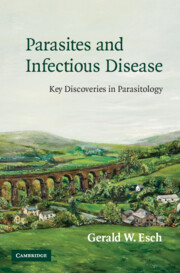Book contents
- Frontmatter
- Contents
- Preface
- Prologue
- 1 African trypanosomes and their VSGs
- 2 Malaria: the real killer
- 3 The HIV–AIDS vaccine and the disadvantage of natural selection: the yellow fever vaccine and the advantage of artificial selection
- 4 Lyme disease: a classic emerging disease
- 5 The discovery of ivermectin: a ‘crapshoot’, or not?
- 6 “You came a long way to see a tree”
- 7 Infectious disease and modern epidemiology
- 8 The ‘unholy trinity’ and the geohelminths: an intractable problem?
- 9 Hookworm disease: insidious, stealthily treacherous
- 10 The spadefoot toad and Pseudodiplorchis americanus: an amazing story of two very aquatic species in a very dry land
- 11 The schistosomes: split-bodied flukes
- 12 Dicrocoelium dendriticum and Halipegus occidualis: their life cycles and a genius at work
- 13 Trichinosis and Trichinella spp. (all eight of them, or is it nine?)
- 14 Phylogenetics: a contentious discipline
- 15 Toxoplasma gondii, Sarcocystis neurona, and Neospora caninum: the worst of the coccidians?
- Summary
- Index
- References
14 - Phylogenetics: a contentious discipline
Published online by Cambridge University Press: 24 November 2009
- Frontmatter
- Contents
- Preface
- Prologue
- 1 African trypanosomes and their VSGs
- 2 Malaria: the real killer
- 3 The HIV–AIDS vaccine and the disadvantage of natural selection: the yellow fever vaccine and the advantage of artificial selection
- 4 Lyme disease: a classic emerging disease
- 5 The discovery of ivermectin: a ‘crapshoot’, or not?
- 6 “You came a long way to see a tree”
- 7 Infectious disease and modern epidemiology
- 8 The ‘unholy trinity’ and the geohelminths: an intractable problem?
- 9 Hookworm disease: insidious, stealthily treacherous
- 10 The spadefoot toad and Pseudodiplorchis americanus: an amazing story of two very aquatic species in a very dry land
- 11 The schistosomes: split-bodied flukes
- 12 Dicrocoelium dendriticum and Halipegus occidualis: their life cycles and a genius at work
- 13 Trichinosis and Trichinella spp. (all eight of them, or is it nine?)
- 14 Phylogenetics: a contentious discipline
- 15 Toxoplasma gondii, Sarcocystis neurona, and Neospora caninum: the worst of the coccidians?
- Summary
- Index
- References
Summary
There never was in the world two opinions alike, no more than two hairs, or two grains; the most universal quality is diversity.
‘Of the Resemblance of Children to their Fathers’, Essays, Book II, Michel de Montaigne (1533–1592)Whenever my wife and I go to London, we always stay at the same hotel in Kensington. Our favorite pub, The Goat, is nearby on Kensington High Street. Not too long ago, I recall sitting with Pete Olson and one of his postdocs in our pub enjoying a pint of lager. Pete, his postdoc, and I were talking about the Journal of Parasitology and some of what goes on in terms of editing. During the conversation, I mentioned that the only really contentious issues that have arisen over the years generally involved confrontations between referees and authors concerned with systematics/phylogenetics papers. I said to Pete, “Aside from natural personality clashes between certain folks, why do you suppose this is the case?” Pete responded immediately, like he knew the question was coming and had prepared an answer in advance. He said, “This is the only area of parasitology where opinion is acceptable in print form.”
When Pete said this, I knew exactly what he meant, because when one thinks about it, a genus and species is really nothing more than a hypothetical construct. It is an opinion, well considered and documented in most cases, but still an opinion. When dealing with hypotheses, people will often have different ideas about them.
- Type
- Chapter
- Information
- Parasites and Infectious DiseaseDiscovery by Serendipity and Otherwise, pp. 315 - 327Publisher: Cambridge University PressPrint publication year: 2007

